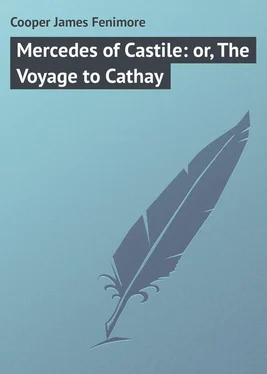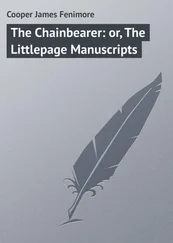James Cooper - Mercedes of Castile - or, The Voyage to Cathay
Здесь есть возможность читать онлайн «James Cooper - Mercedes of Castile - or, The Voyage to Cathay» — ознакомительный отрывок электронной книги совершенно бесплатно, а после прочтения отрывка купить полную версию. В некоторых случаях можно слушать аудио, скачать через торрент в формате fb2 и присутствует краткое содержание. Жанр: foreign_prose, на английском языке. Описание произведения, (предисловие) а так же отзывы посетителей доступны на портале библиотеки ЛибКат.
- Название:Mercedes of Castile: or, The Voyage to Cathay
- Автор:
- Жанр:
- Год:неизвестен
- ISBN:нет данных
- Рейтинг книги:4 / 5. Голосов: 1
-
Избранное:Добавить в избранное
- Отзывы:
-
Ваша оценка:
- 80
- 1
- 2
- 3
- 4
- 5
Mercedes of Castile: or, The Voyage to Cathay: краткое содержание, описание и аннотация
Предлагаем к чтению аннотацию, описание, краткое содержание или предисловие (зависит от того, что написал сам автор книги «Mercedes of Castile: or, The Voyage to Cathay»). Если вы не нашли необходимую информацию о книге — напишите в комментариях, мы постараемся отыскать её.
Mercedes of Castile: or, The Voyage to Cathay — читать онлайн ознакомительный отрывок
Ниже представлен текст книги, разбитый по страницам. Система сохранения места последней прочитанной страницы, позволяет с удобством читать онлайн бесплатно книгу «Mercedes of Castile: or, The Voyage to Cathay», без необходимости каждый раз заново искать на чём Вы остановились. Поставьте закладку, и сможете в любой момент перейти на страницу, на которой закончили чтение.
Интервал:
Закладка:
"Prithee, Pepe," commenced the soldier, "how many hundred doblas a year do they pay, in that service of thine, and how often do they renew that fine leathern doublet?"
The varlet, or follower of the merchant, who was still a youth, though his vigorous frame and embrowned cheek denoted equally severe exercise and rude exposure, started and reddened at this free inquiry, which was enforced by a hand slapped familiarly on his knee, and such a squeeze of the leg as denoted the freedom of the camp. The laugh of Diego probably suppressed a sudden outbreak of anger, for the soldier was one whose manner indicated too much good-humor easily to excite resentment.
"Thy gripe is friendly, but somewhat close, comrade," the young domestic mildly observed; "and if thou wilt take a friend's counsel, it will be, never to indulge in too great familiarity, lest some day it lead to a broken pate."
"By holy San Pedro! – I should relish – "
It was too late, however; for his master having proceeded, the youth pushed a powerful rowel into the flank of his mule, and the vigorous animal dashed ahead, nearly upsetting Diego, who was pressing hard on the pommel of the saddle, by the movement.
"There is mettle in that boy," exclaimed the good-natured soldier, as he recovered his feet. "I thought, for one moment, he was about to favor me with a visitation of his hand."
"Thou art wrong – and too much accustomed to be heedless, Diego," answered his comrade; "and it had been no wonder had that youth struck thee to the earth, for the indignity thou putt'st upon him."
"Ha! a hireling follower of some cringing Hebrew! He dare to strike a blow at a soldier of the king!"
"He may have been a soldier of the king himself, in his day. These are times when most of his frame and muscle are called on to go in harness. I think I have seen that face before; ay, and that, too, where none of craven hearts would be apt to go."
"The fellow is a mere varlet, and a younker that has just escaped from the hands of the women."
"I'll answer for it, that he hath faced both the Catalan and the Moor in his time, young as he may seem. Thou knowest that the nobles are wont to carry their sons, as children, early into the fight, that they may learn the deeds of chivalry betimes."
"The nobles!" repeated Diego, laughing. "In the name of all the devils, Roderique, of what art thou thinking, that thou likenest this knave to a young noble? Dost fancy him a Guzman, or a Mendoza, in disguise, that thou speakest thus of chivalry?"
"True – it doth, indeed, seem silly – and yet have I before met that frown in battle, and heard that sharp, quick voice, in a rally. By St. Iago de Compostello! I have it! Harkee, Diego! – a word in thy ear."
The veteran now led his more youthful comrade aside, although there was no one near to listen to what he said; and looking carefully round, to make certain that his words would not be overheard, he whispered, for a moment, in Diego's ear.
"Holy Mother of God!" exclaimed the latter, recoiling quite three paces, in surprise and awe. "Thou canst not be right, Roderique!"
"I will place my soul's welfare on it," returned the other, positively. "Have I not often seen him with his visor up, and followed him, time and again, to the charge?"
"And he setting forth as a trader's varlet! Nay, I know not, but as the servitor of a Jew!"
"Our business, Diego, is to strike without looking into the quarrel; to look without seeing, and to listen without hearing. Although his coffers are low, Don John is a good master, and our anointed king; and so we will prove ourselves discreet soldiers."
"But he will never forgive me that gripe of the knee, and my foolish tongue. I shall never dare meet him again."
"Humph! – It is not probable thou ever wilt meet him at the table of the king, and, as for the field, as he is wont to go first, there will not be much temptation for him to turn back in order to look at thee."
"Thou thinkest, then, he will not be apt to know me again?"
"If it should prove so, boy, thou need'st not take it in ill part; as such as he have more demands on their memories than they can always meet."
"The Blessed Maria make thee a true prophet! – else would I never dare again to appear in the ranks. Were it a favor I conferred, I might hope it would be forgotten; but an indignity sticks long in the memory."
Here the two soldiers moved away, continuing the discourse from time to time, although the elder frequently admonished his loquacious companion of the virtue of discretion.
In the mean time, the travellers pursued their way, with a diligence that denoted great distrust of the roads, and as great a desire to get on. They journeyed throughout the night, nor did there occur any relaxation in their speed, until the return of the sun exposed them again to the observations of the curious, among whom were thought to be many emissaries of Henry of Castile, whose agents were known to be particularly on the alert, along all the roads that communicated between the capital of Aragon and Valladolid, the city in which his royal sister had then, quite recently, taken refuge. Nothing remarkable occurred, however, to distinguish this journey from any other of the period. There was nothing about the appearance of the travellers – who soon entered the territory of Soria, a province of Old Castile, where armed parties of the monarch were active in watching the passes – to attract the attention of Henry's soldiers; and as for the more vulgar robber, he was temporarily driven from the highways by the presence of those who acted in the name of the prince. As respects the youth who had given rise to the discourse between the two soldiers, he rode diligently in the rear of his master, so long as it pleased the latter to remain in the saddle; and during the few and brief pauses that occurred in the travelling, he busied himself, like the other menials, in the duties of his proper vocation. On the evening of the second day, however, about an hour after the party had left a hostelry, where it had solaced itself with an olla-podrida and some sour wine, the merry young man who has already been mentioned, and who still kept his place by the side of his graver and more aged companion in the van, suddenly burst into a fit of loud laughter, and, reining in his mule he allowed the whole train to pass him, until he found himself by the side of the young menial already so particularly named. The latter cast a severe and rebuking glance at his reputed master, as he dropped in by his side, and said, with a sternness that ill comported with their apparent relations to each other —
"How now, Master Nuñez! what hath called thee from thy position in the van, to this unseemly familiarity with the varlets in the rear?"
"I crave ten thousand pardons, honest Juan," returned the master, still laughing, though he evidently struggled to repress his mirth, out of respect to the other; "but here is a calamity befallen us, that outdoes those of the fables and legends of necromancy and knight-errantry. The worthy Master Ferreras, yonder, who is so skilful in handling gold, having passed his whole life in buying and selling barley and oats, hath actually mislaid the purse, which it would seem he hath forgotten at the inn we have quitted, in payment of some very stale bread and rancid oil. I doubt if there are twenty reals left in the whole party!"
"And is it a matter of jest, Master Nuñez," returned the servant, though a slight smile struggled about his mouth, as if ready to join in his companion's merriment; "that we are penniless? Thank Heaven! the Burgo of Osma cannot be very distant; and we may have less occasion for gold. And now, master of mine, let me command thee to keep thy proper place in this cavalcade, and not to forget thyself by such undue familiarity with thy inferiors. I have no farther need of thee, and therefore hasten back to Master Ferreras and acquaint him with my sympathy and grief."
Читать дальшеИнтервал:
Закладка:
Похожие книги на «Mercedes of Castile: or, The Voyage to Cathay»
Представляем Вашему вниманию похожие книги на «Mercedes of Castile: or, The Voyage to Cathay» списком для выбора. Мы отобрали схожую по названию и смыслу литературу в надежде предоставить читателям больше вариантов отыскать новые, интересные, ещё непрочитанные произведения.
Обсуждение, отзывы о книге «Mercedes of Castile: or, The Voyage to Cathay» и просто собственные мнения читателей. Оставьте ваши комментарии, напишите, что Вы думаете о произведении, его смысле или главных героях. Укажите что конкретно понравилось, а что нет, и почему Вы так считаете.












